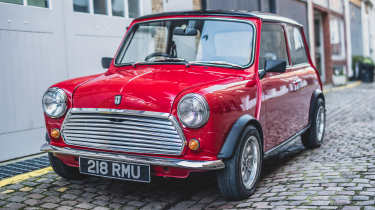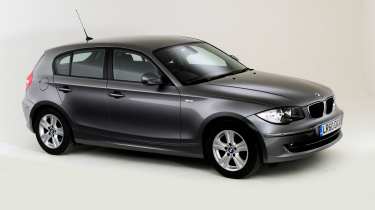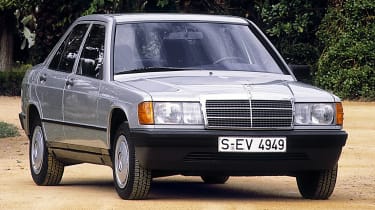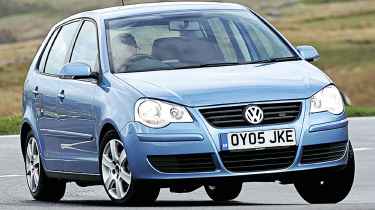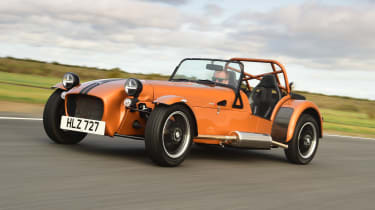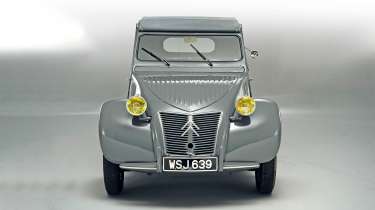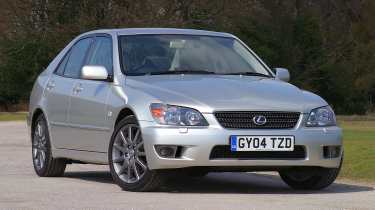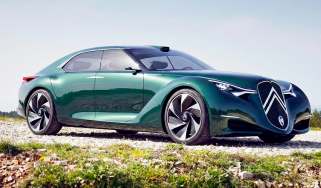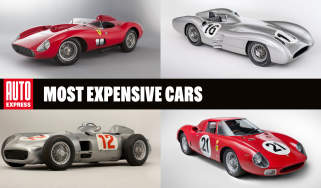Best project cars
Grab your toolkit and get stuck in as we reveal the best project cars to buy right now
If you've got some money burning a hole in your pocket, you might be tempted to pick up one of the best project cars to fix up on the weekends. To help you get a sense of what’s out there, we’ve selected ten great project car options of varying ages, budgets, and levels of mechanical involvement. Some are aimed at those who like to modify and customise, others are perfect for home maintenance, and one of them you need to build yourself from scratch.
Best project cars
- Mazda MX-5 (Mk1/Mk2)
- Mini (BMC/Morris/Austin/Leyland/Rover)
- BMW 1 Series (E82/E87/E88)
- Mercedes 190 (W201)
- Volkswagen Polo (Mk4)
- Caterham Seven
- Land Rover Discovery (Series 1/Series 2)
- Citroen 2CV
- Lexus IS (Mk1)
- Ford Puma (Mk1)
Mazda MX-5 (Mk1/Mk2)
- Production dates: 1989-2005
- Prices from: £1,000
There’s a joke in the car community that “The Answer Is Always Miata”, Miata being the US name for the car we know as the Mazda MX-5. Essentially, whatever you want from a car, you can probably get it from an MX-5 – and while realistically that’s not quite the case, an MX-5 still ticks an enormous number of boxes.
The Mk1 (NA) and Mk2 (NB) models have been creeping up in price in recent years, but are still very affordable unless you want the most pristine examples – and you probably won’t be looking at those for a project anyway. MX-5s are also some of the most reliable cars around, parts prices aren’t too expensive – whether from Mazda directly or the hundreds of aftermarket suppliers – and running costs aren’t high either.
All MX-5s rust eventually, so that’s most likely to be the biggest area of concern. Still, there are replacement panels for most parts, and enough MX-5 specialists out there to do the really tricky jobs. Better still, the global enthusiast community is enormous – Mazda’s built more than a million of them, after all. It’s just about the perfect project car for the modern era.
Mini (BMC/Morris/Austin/Leyland/Rover)
- Production dates: 1959-2000
- Prices from: £4,000
Short of maybe an MGB or a Morris Minor, the Mini is surely the archetypal British project car. No nameplate is more beloved, but with now even the very newest classic Minis being around a quarter century old, and the earliest now well over 60, the Mini is as much a project car candidate as it is a rally winner or a style icon.
It's been a long time since you could pick up a dodgy Mini for 500 quid from a windswept used car dealer. Now you’re probably looking at ten times that for something that doesn’t need sweeping up, so a Mini project will need some financial outlay to start with. But things get better from there, since you can buy affordable replacements or upgrades for basically every single part on a Mini, up to and including an entirely new shell (though that’s a little less affordable).
The Mini has one of the biggest and most helpful communities of any car too, so if you get stuck, there’s sure to be another owner or a specialist willing to help out. Few cars are more easy to personalise either, so whether you’re just tidying a Mini up, modifying it, or going for a full restoration, the end result is really up to you.
BMW 1 Series (E82/E87/E88)
- Production dates: 2004-2011
- Prices from: £600
If the first-generation BMW 1 Series, in both hatchback and coupe forms, seems a little new to be on a project car list, then consider that the earliest models are now two decades old. That means two things: there are some rough ones around that are ripe for attention, and that the original 1 Series is currently very affordable indeed.
Other early 2000s hatchbacks are cheap now too of course, but only the 1 Series is rear-wheel drive, and that makes it attractive for different reasons. There have been race series for the car for several years already, so that’s something you might do with a cheap 1 Series, but they’re becoming affordable track day and drift cars too, with the right modifications – you can almost consider them a tin-top Mazda MX-5.
Their ubiquity means parts are still plentiful, experience is abundant, and they aren’t especially difficult to work on either. And even if you aren’t planning on turning a cheap 1 Series into a track day toy, the car’s distinctive Chris Bangle-era styling is sure to become a talking point at modern classic car shows over the coming years.
Mercedes 190 (W201)
- Production dates: 1982-1993
- Prices from: £1,500
Many car companies will claim their smaller cars are simply condensed versions of their larger and more expensive ones, hoping some prestige will rub off on the cheaper model, but that’s mostly marketing speak. The Mercedes 190 launched in 1982, however, really did have all the quality of the firm’s biggest cars, and was in some ways more advanced – Mercedes developed multi-link rear suspension especially for this car, a technology now found across the industry.
Today the 190 makes for one of the most usable modern classics around, and a fantastic project car too. Both are down to the quality and longevity Mercedes imbued this car with when it was new, which means they’ve lasted well, are very reliable when looked after, and that working on them is a pleasure.
Being a Mercedes, some parts prices may cost a little more than you’d expect – especially those directly from Mercedes-Benz Classic – but there’s plenty of good alternative parts out there to offset some of the cost. The 190 remains a pleasure to drive, and it’s compact too, around the same length as a modern Mercedes A-Class hatchback despite its classic three-box body, and much narrower, so it’ll fit in even quite small garages.
Volkswagen Polo (Mk4)
- Production dates: 2002-2009
- Prices from: £1,000
We’ll concede that the Mk4 Volkswagen Polo launched in 2002 isn’t the most exciting of project car candidates, on the face of it. Other than its cheerful four-light front end, it’s a bit of a generic supermini: something that would be pleasant enough to toddle around in, but possibly not a car to really get stuck into.
The Polo’s ubiquity works in its favour though because these cars are currently very affordable. Great if you’re a new driver, and great if you’re looking for a car to play around with too. Especially as the Polo has another ace up its sleeve: plenty of parts interchangeability with the rest of the vast Volkswagen empire.
This encompasses everything from basics like alloy wheels – we’ve seen them on everything from Audi to Porsche wheels – to engine swaps. VW’s 1.8-litre turbocharged four is popular, not least as the brand put it in the later facelift Mk4 Volkswagen Polo GTI, but if you’re feeling mischievous, a few owners have installed the group’s VR6 unit too. Even diesels are well catered for with remaps and tuning parts – basically, the Mk4 Polo offers endless scope for modification and personalisation.
Caterham Seven
- Production dates: 1957-present
- Prices from: £12,000
The Caterham Seven is a little different from other cars on this list in that you can still buy one new. And that’s the point: you can go to Caterham, order a box of bits, and build an entire car in your garage, from scratch, from brand new parts. No rust to worry about, no welding required, and no hunting down rare trim or ancillaries.
This will cost a little more than some other projects here, naturally. A brand new Caterham Seven 170 starts at just under £30,000, and if you want them to deliver your kit and a box of suitable tools it’s another £1,200 right away. But again, there are no nasty surprises, other than perhaps that the instruction booklet is a little trickier than the ones you get from Ikea or with a Lego kit…
Build time varies depending on your skill with a spanner and whether your friends/colleagues/spouse/children are around to help, but Caterham reckons on around 80-100 hours work. Then there are two more advantages to the Seven to enjoy: the fact that maintenance is equally simple, and that it’s still one of the most involving and exciting sports cars ever made.
Land Rover Discovery (Series 1/Series 2)
- Production dates: 1989-2004
- Prices from: £1,000
If your idea of the perfect project car is one that can take you out into the wilderness, then you’ve probably considered a Land Rover at some point. The Defender is surely at the top of everyone’s list, but Defenders are expensive now, and that’s where the first-generation Land Rover Discovery comes in: it’s very nearly as capable, but easier to live with and a whole lot cheaper.
We think it’s also quite a handsome-looking 4x4, with appealingly chunky lines, plenty of glass, and that neat kink in the roofline to house its iconic pair of ‘safari windows’, which became the Disco’s signature look. The Conran-designed interior of pre-1994 Series 1 cars is distinctive too.
Power comes from a range of petrol and diesel units with varying ability and reliability. Old Landies are tough, but not infallible, and among other issues like rust, you can use some of the car’s ailments as a bargaining tool for a project car – safe in the knowledge that there isn’t a lot you can’t fix or improve on the Discovery. Early cars are going up in value and make good restoration candidates, while later ones (the Series 2 went up until 2004) are affordable off-road playthings.
Citroen 2CV
- Production dates: 1948-1990
- Prices from: £4,000
Like the classic Mini elsewhere on this list, the Citroen 2CV makes a near-perfect project. These cars are easy to find because Citroen made nearly 4 million of them, but prices for solid examples have slowly been on the rise. There’s always the option of bringing one over from mainland Europe too – in a car like this, left-hand drive really doesn’t make much difference to your enjoyment.
Parts supply is nearly as good, from mechanical parts and interior odds and ends to an entire galvanised chassis and replacement body panels. Few cars are easier to work on either. Almost the entire front comes off for engine access, and being aircooled, there’s no cooling system to drain and refill.
It has to be said, 2CVs are an absolute hoot to drive too. They’re not very quick of course but you can drive flat out nearly everywhere and not worry about speed cameras as a result. The push-pull-twist gear change seems complex at first but is easy to master and has a great mechanical feel, and you’ll run out of nerve before a 2CV runs out of cornering ability…
Lexus IS (Mk1)
- Production dates: 1998-2005
- Prices from: £1,500
We could have picked an old BMW 3 Series here, but the original Lexus IS – the brand’s competitor for the 3 Series back in the late 1990s – is an attractive alternative. Almost literally in fact, as Lexus benchmarked the E36 generation 3 Series when it developed the IS so has similarly chunky proportions and neat body lines, just with a Japanese twist.
It wasn’t so long ago that used IS200s and IS300s were almost everywhere, but their numbers have dwindled in recent years. Being rear-wheel drive, and standing up to punishment, they’ve become popular budget track and drift cars. This means plenty have endured welded differentials, bolt-on arch extensions, and ended their lives in tyre barriers, but the remaining cars are still affordable, for the time being.
All UK models were six-cylinder, two litres in the IS200 and three litres for the IS300 – the latter the same as in the legendary 1990s Toyota Supra. The IS is generally reliable, but rust can be a problem now, so you may need to add that to your project car to-do list. Whether you’re aiming for a pristine late-90s time capsule or plan on turning it into a sharp Japanese road-racer though, the IS makes a great starting point.
Ford Puma (Mk1)
- Production dates: 1997-2002
- Prices from: £1,500
Our last car is the Ford Puma. No, not the current SUV-style model – it’ll be a while before we see YouTubers digging those out of hedges and resuscitating them for views. Instead we’re talking about the original Puma, launched in 1997. It’s one of Ford’s all-time greats, but pumped up Racing Puma models aside, it’s still incredibly affordable, considering how beloved it was by both reviewers and owners for its fab handling and distinctive design.
The biggest reason for this is probably rust. Those Ian Callum-penned lines sadly weren’t given quite the same love and attention when the car was constructed, and almost any cheap Puma these days will be riddled with reddish-brown scars. If your project car aspirations include improving your welding skills though this might actually be perfect, particularly as you can still get pattern parts – you won’t need to try and replicate all those curves by hand.
The Puma’s revvy engines aren’t immune to small issues either, especially the top-dog Yamaha-designed 1.7-litre, but the good news with an old Ford is that specialists and part suppliers abound. Some interior trim may be tricky to find now, but the dashboard at least is Mk4 Fiesta sourced, which opens up the range of donors.
Are you working on a project car already? Tell us about it in the comments section below...


